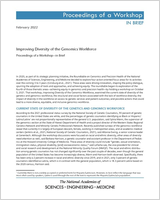From: Improving Diversity of the Genomics Workforce

NCBI Bookshelf. A service of the National Library of Medicine, National Institutes of Health.
The Minority Genetic Professionals Network (MGPN)a is a project of the Western States Regional Genetics Network, funded by the Health Resources and Services Administration. The network is intended to “increase access to genetic services and education for racial and ethnic minority families by increasing the number of underrepresented genetics providers,” Mann explained. It focuses on supporting the recruitment and mentoring of underrepresented trainees and practicing professionals. MGPN activities include outreach, networking, mentoring, interview practice, research support, self-care, and professional development. MGPN also focuses on high school students so that they are aware of genetic counseling as a career option when considering colleges and when selecting college classes (to ensure that the prerequisites for application to graduate programs are met). Members of local and regional MGPN groups participate in high school and undergraduate local, regional, and national career fairs to raise awareness of all genetics professions. Career fairs went virtual during the COVID-19 pandemic, and there were more than 1,400 attendees at the second annual MGPN virtual career fair for genetic counseling, Mann said.
The Genetics Opportunity, Learning, Development, and Empowerment Network (GOLDEN)b was co-founded by Barbara Harrison and Grace-Ann Fasaye and is funded by the New York Mid-Atlantic Caribbean Regional Genetics Network.c The mission of GOLDEN is to increase the number of Black genetic counselors by increasing awareness of the profession and mentoring prospective applicants. The program has reached out to HBCUs and to high schools and community colleges with high racial and ethnic minority student representation via information sessions at schools and through social media. Several 2-minute videos and an hour-long presentation on pursuing a genetic counseling career are available. Importantly, recruitment materials feature Black genetic counselors and students, so that prospective students can see themselves in these roles, Harrison said. Virtual mentoring events include case conferences with cases that address DEIJ, interview practice, and a review of personal statements for applications. There are also financial incentives available to students to help offset application costs and to provide compensation for the genetic counselors who share their time and talents.
The UNMC High School Allianced was established a decade ago by the University of Nebraska Medical Center (UNMC) in association with the Omaha Public School District to draw junior and senior high school students from diverse background to careers in the biomedical sciences. Each year, about 50 students who are selected for this immersive academic enrichment program spend 2 hours each school day at the UNMC campus taking classes taught by UNMC faculty. Students choose from a range of health care and research topics, including biomedical research, human anatomy, human genetics, public health, pharmacy, imaging, and others. Students also attend a weekly health careers exploration session, an opportunity for professionals to engage with students about careers in genetics, Abdul-Rahman said. Of the 500 students who have completed the Alliance program, 97 percent went on to attend college, 70 percent pursued a health-related major, and more than half went into a health-related profession (Davies et al., 2022). In August 2020, UNMC launched an online health science curriculum that is available for use by teachers nationwide.
Minority Genetic Professionals Network, https://mgpn
GOLDEN interest form, https://docs
NYMAC Regional Genetics Network, New York Mid-Atlantic Caribbean Regional Genetics Network, https:
UNMC High School Alliance: Health Sciences Enrichment Program, University of Nebraska Medical Center, https://www
From: Improving Diversity of the Genomics Workforce

NCBI Bookshelf. A service of the National Library of Medicine, National Institutes of Health.